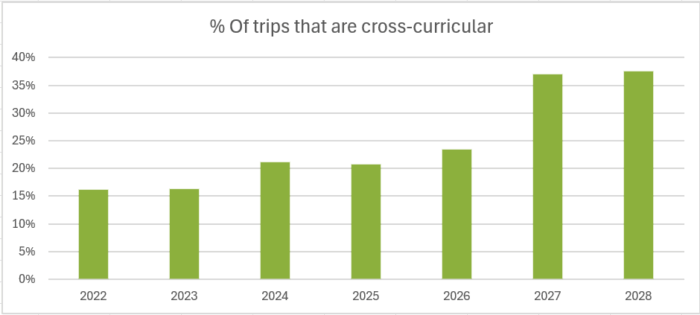Marketing Intern at Experience Education
Daisy Mae has recently joined the Experience Education team, before working as a ski rep in Alpe d’Huez with SkiBound! Daisy studied Marketing and Management at the University of East Anglia and loves to travel, having interrailed around Europe and explored West Coast USA.

Cross-curricular school trips bring subjects together, creating a well-rounded experience that combines learning with unforgettable excursions. Our recent Travelbound data highlights the growing trend for cross-curricular school trips. We’ve put together 10 inspiring reasons why a cross-curricular school trip can be such a rewarding choice – though the benefits soon speak for themselves.

1. Broader student appeal
By including several subjects into one school trip, cross-curricular trips attract a wider range of students and can boost participation levels. This can make it more likely that your students will sign up and the trip will have enough uptake to be launched.
2. One trip, multiple learning outcomes
Enrich multiple areas of the curriculum and various subjects at once. This is perfect for KS3/KS4 as students will be looking ahead to decide subjects for further study or alternative options. An engaging trip can support students in terms of steering their future decisions and boost interest in certain subject areas in a way that classroom learning might not reach.
3. Shared travel dates mean less disruption
We know it’s hard to find time in the academic calendar and also be granted permission for the trip in the first place. Combining experiences to once cross-curricular school trip results in the students and staff involved being off-site during the same window, minimising the impact on the school timetable.
4. Economy of scale
Organising a trip for a larger group can mean a lower cost per student. You may also benefit from better rates on transport, accommodation, and excursions. This will not only lead to a gain in support from your finance team, but also parents who may be financially restricted. Having one trip covering multiple topics or subjects means fewer trips for parents to fund and less cost overall.
5. Shared trip planning & admin
Organising a cross-curricular school trip means one trip proposal, one set of risk assessments and one parent meeting, all through one supplier like Travelbound. Reducing planning workload by consolidating effort means less area needed for approval and more time can be spent planning the actual trip.
6. Boosts cross-department collaboration
Cross-curricular school trips help to build teamwork across subject areas, creating a stronger sense of whole-school enrichment. These trips also mean there is a wider choice of staff who could be involved, and planning and delivery doesn’t lean too heavily on one department’s staff exclusively.
7. Great for whole school morale
When more students and staff can join, it becomes a much greater talking point across year groups and provides shared memories throughout the school.
8. Stronger case for SLT approval
Trips that serve and support multiple curriculum areas and a wider range of students often gain quicker support from leadership. It can be easier to demonstrate value when the trip supports multiple subjects and offers good value.
9. Flexible Itineraries
Many destinations offer a wide range of activities that can be tailored to a wide variety of subjects. Here’s an example from a West Coast USA itinerary:
San Francisco, for example, is a city full of possibilities. Take a tour to Alcatraz to learn about the justice system and law enforcement, which is great for history students to comprehend. English lovers will be engulfed by the emotive stories of inmates and escape attempts.
Haight Ashbury, the birthplace of the hippie movement, can allow students to explore the development of modern America and the Civil Rights Movement. The area will allow art student’s imaginations to run wild, with an influx of radical visual expressionism.
The Six Flags Discovery Kingdom can provide strong links to various curriculm. KS3 and KS4 physics students will be able to reference subjects such as Newton’s Laws, energy transfer and friction. Engineering minds will also be put to work when understanding how mechanical systems work, and using their knowledge of structures, materials and mechanics during this excursion
10. Prepares students for real-world thinking
Cross-curricular school trips reflect how knowledge connects in real life. Helping students see the bigger picture beyond the classroom and seeing how different subjects or curriculum can interlink for greater understanding.
If you’d like to start planning a cross-curricular trip, we’d love to discuss your ideas, help you pick a destination and choose excursions that bring learning to life outside of the classroom.

Comments are closed here.